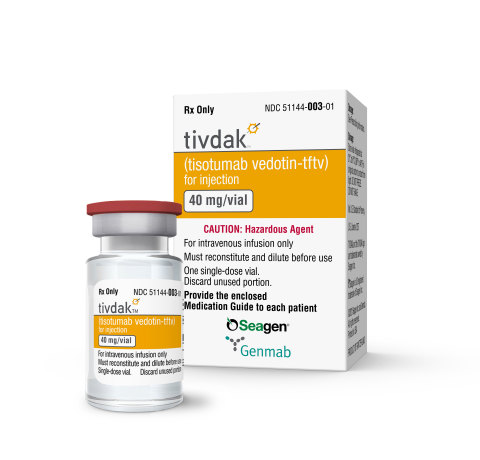COPENHAGEN, Denmark & BOTHELL, Wash.– Genmab A/S (Nasdaq: GMAB) and Seagen Inc. (Nasdaq: SGEN) today announced that the U.S. Food and Drug Administration (FDA) has granted accelerated approval to TIVDAK™ (tisotumab vedotin-tftv), the first and only approved antibody-drug conjugate (ADC) for the treatment of adult patients with recurrent or metastatic cervical cancer with disease progression on or after chemotherapy. TIVDAK is approved under the FDA’s Accelerated Approval Program based on tumor response and the durability of the response. Continued approval may be contingent upon verification and description of clinical benefit in confirmatory trials.1
“Once recurrent or metastatic cervical cancer progresses, there is a need for more options for these patients,” said Robert L. Coleman, M.D., Chief Scientific Officer, US Oncology Research and lead investigator of the innovaTV 204 clinical trial. “This is an important development for patients with recurrent or metastatic cervical cancer.”
In the innovaTV 204 clinical trial, TIVDAK was evaluated in 101 patients with recurrent or metastatic cervical cancer who had received no more than two prior systemic regimens in the recurrent or metastatic setting, including at least one prior platinum-based chemotherapy regimen. Results from the trial showed a 24 percent confirmed objective response rate (ORR) (95% CI; 15.9-33.3), as assessed by an independent review committee (IRC) using Response Evaluation Criteria in Solid Tumors (RECIST) v1.1 criteria. The median duration of response (DOR) was 8.3 months (95% CI; 4.2 to not reached).
The prescribing information for TIVDAK includes a BOXED WARNING for ocular toxicity, and Warnings for peripheral neuropathy, hemorrhage, pneumonitis, and embryo-fetal toxicity. The most common (≥25%) adverse reactions, including laboratory abnormalities, were hemoglobin decreased (52%), fatigue (50%), lymphocytes decreased (42%), nausea (41%), peripheral neuropathy (39%), alopecia (39%), epistaxis (39%), conjunctival adverse reactions (37%), hemorrhage (32%), leukocytes decreased (30%), creatinine increased (29%), dry eye (29%), prothrombin international normalized ratio increased (26%), activated partial thromboplastin time prolonged (26%), diarrhea (25%), and rash (25%). Please see Important Safety Information below.1
“We are thrilled to see this new treatment approved by the FDA. We are grateful to have another option for this devastating disease,” said Tamika Felder, Founder, Cervivor.
“TIVDAK’s approval as a monotherapy in the U.S. is an important milestone for women with recurrent or metastatic cervical cancer with disease progression on or after chemotherapy, as they are in need of a new treatment option and we look forward to making it available to them,” said Jan van de Winkel, Ph.D., Chief Executive Officer, Genmab. “The journey towards the approval of TIVDAK started nearly two decades ago with innovative research by scientists at Genmab and Seagen and reflects on our purpose of making an impact in the lives of cancer patients and their families. Today’s announcement marks Genmab’s evolution into a fully integrated biotechnology company and we would like to thank patients, caregivers, investigators and our collaborators for their participation in our clinical studies.”
“We are pleased with the accelerated approval of TIVDAK, Seagen’s third FDA-approved antibody-drug conjugate, and fourth approved medicine. Our mission at Seagen is to develop medicines that make a difference for people impacted by cancer,” said Roger Dansey, M.D., Chief Medical Officer, Seagen.
The Biologics License Application (BLA) for TIVDAK was submitted in February 2021 and accepted with Priority Review in April 2021. The submission was based on the results of the innovaTV 204 trial.
The FDA’s Accelerated Approval Program allows for approval of a medicine based on a surrogate endpoint that is reasonably likely to predict clinical benefit, if the medicine fills an unmet medical need for a serious condition. A global, randomized phase 3 clinical trial (innovaTV 301) is underway and is also intended to support global registrations.


